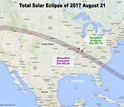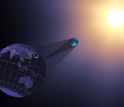Media Advisory 17-010
NSF/NASA/NCAR press conference: What will scientists learn from the August 21 total solar eclipse?
Total solar eclipse is first to cross the U.S. in nearly a century, giving scientists unique research opportunities

NSF, NASA, and NCAR scientists will talk about research on the August, 2017 solar eclipse.
July 12, 2017
This material is available primarily for archival purposes. Telephone numbers or other contact information may be out of date; please see current contact information at media contacts.
The total solar eclipse next month is the first to cross the U.S. from coast to coast in nearly a century, giving scientists a unique opportunity to observe the sun's corona with an array of technologies and methodologies.
Findings from these eclipse experiments will advance our knowledge of the sun's complex and mysterious magnetic field as well as its effect on Earth's atmosphere.
The National Science Foundation (NSF)-supported National Center for Atmospheric Research (NCAR) is hosting a press conference for national, regional and local reporters on July 21, 2017, one month before the eclipse.
Speakers from NSF, NCAR and NASA will discuss how the sun will be observed during the eclipse with networks of ground-based telescopes, GPS sensors, radio receivers and specialized instruments on aircraft, satellites and space-based observatories.
EVENT DETAILS
WHAT: Press conference on research related to the Aug. 21, 2017, total solar eclipse
WHO: Carrie Black, Associate Program Director, NSF Division of Atmospheric and Geospace Sciences; Madhulika (Lika) Guhathakurta, Lead Program Scientist, NASA Living with a Star; and Scott McIntosh, Director, NCAR High Altitude Observatory
WHEN: Friday, July 21, 2017, 12:00 p.m. EDT
WHERE: Center Green 1 Conference Center, 3080 Center Green Drive, Boulder, Colorado
REMOTE ACCESS: Reporters may watch the press conference and ask questions remotely. To register, please see: https://attendee.gotowebinar.com/register/1245340238830049281.
The public may watch a live stream of the press conference at https://ucarconnect.ucar.edu/live?room=cg1aud.
-NSF-
-
A rare event: a total solar eclipse that will cross the U.S. from coast to coast.
Credit and Larger Version -
In the U.S., the August 21, 2017, solar eclipse will culminate in Charleston, South Carolina.
Credit and Larger Version -
Graphic showing the positions of Earth, moon, and sun during a total solar eclipse.
Credit and Larger Version -
Totality: view of the sun when a total solar eclipse has arrived.
Credit and Larger Version
Media Contacts
Cheryl Dybas, NSF, (703) 292-7734, email: cdybas@nsf.gov
David Hosansky, NCAR, (303) 497-8611, email: hosansky@ucar.edu
Related Websites
NSF Special Report: Solar Science: Exploring the Power of Our Closest Star: https://www.nsf.gov/news/special_reports/solarscience/index.jsp
The U.S. National Science Foundation propels the nation forward by advancing fundamental research in all fields of science and engineering. NSF supports research and people by providing facilities, instruments and funding to support their ingenuity and sustain the U.S. as a global leader in research and innovation. With a fiscal year 2023 budget of $9.5 billion, NSF funds reach all 50 states through grants to nearly 2,000 colleges, universities and institutions. Each year, NSF receives more than 40,000 competitive proposals and makes about 11,000 new awards. Those awards include support for cooperative research with industry, Arctic and Antarctic research and operations, and U.S. participation in international scientific efforts.
Connect with us online
NSF website: nsf.gov
NSF News: nsf.gov/news
For News Media: nsf.gov/news/newsroom
Statistics: nsf.gov/statistics/
Awards database: nsf.gov/awardsearch/
Follow us on social
Twitter: twitter.com/NSF
Facebook: facebook.com/US.NSF
Instagram: instagram.com/nsfgov






